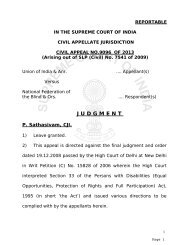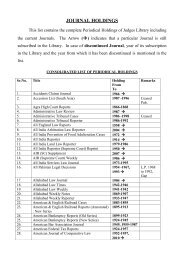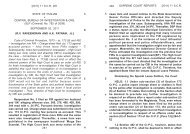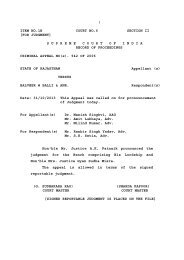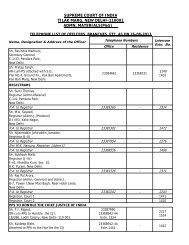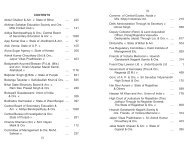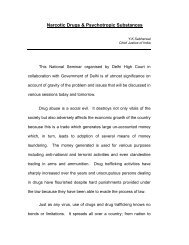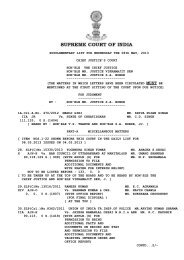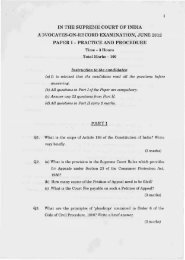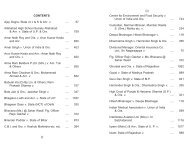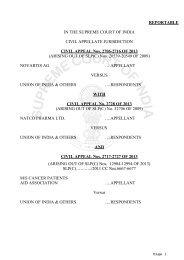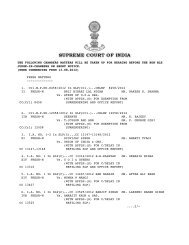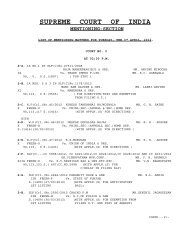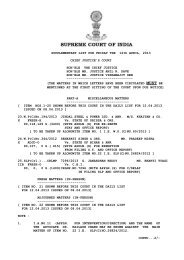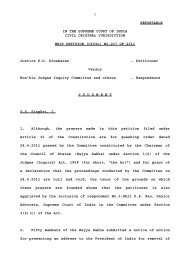Part No.IV - Supreme Court of India
Part No.IV - Supreme Court of India
Part No.IV - Supreme Court of India
Create successful ePaper yourself
Turn your PDF publications into a flip-book with our unique Google optimized e-Paper software.
MAHADEV GOVIND GHARGE v. SPL. LAO UPPER KRISHNA<br />
PROJECT JAMKHANDI, KARNATAKA [ASOK KUMAR GANGULY, J.]<br />
Smt. Mahendra Kumari [AIR 2008 Raj. 131] took the view that<br />
respondent cross-objector had put in appearance through his<br />
counsel as a caveator and the appeal was admitted on 28th<br />
March, 2006 in his presence and participation. As the appeal<br />
was admitted in their presence, the Rajasthan High <strong>Court</strong><br />
opined that no notice thereafter was required to be served on<br />
the caveator for the purposes <strong>of</strong> Order XLI Rule 22 and period<br />
<strong>of</strong> limitation <strong>of</strong> one month would start from 28th March, 2006<br />
(i.e. the date <strong>of</strong> admission) for filing <strong>of</strong> cross-objection. The<br />
filing <strong>of</strong> the cross objection in that case was delayed by 507<br />
days. On the issue <strong>of</strong> condonation the High <strong>Court</strong> felt that the<br />
delay could not be condoned in the facts and circumstances<br />
<strong>of</strong> the case and thus dismissed the cross-objections as barred<br />
by time. It also needs to be noticed that the judgments <strong>of</strong> the<br />
Delhi High <strong>Court</strong> in the case <strong>of</strong> Jhutter Singh (supra) and<br />
Rashida Begum (supra) were also examined by the Rajasthan<br />
High <strong>Court</strong> and are distinguished on facts as in those cases<br />
at no point <strong>of</strong> time the objector or respondent had participated.<br />
50. The Rajasthan High <strong>Court</strong> also relied upon the<br />
judgment <strong>of</strong> the High <strong>Court</strong> <strong>of</strong> Andhra Pradesh in the case <strong>of</strong><br />
Mutyam Agaiah v. Special Deputy Collector, (NTPC) L.A.<br />
Unit. [2002 (2) ALT 715] wherein that High <strong>Court</strong> while<br />
accepting the submissions <strong>of</strong> the respondent had held that:<br />
“…We have to understand the issue <strong>of</strong> notices in the<br />
proper perspective. The notices are meant for giving<br />
knowledge to the other side regarding the judicial<br />
proceedings filed by the appellant. It is not every time<br />
necessary that the notices should be in writing in the<br />
prescribed form. If the knowledge <strong>of</strong> filing <strong>of</strong> the appeals<br />
can be proved, then it is sufficient notice in law. The<br />
respondent-cross objector engaged an Advocate, who<br />
filed vakalatnama and he defended the cause <strong>of</strong> the<br />
claimant in the Original Petition. It means that the crossobjector<br />
had sufficient knowledge regarding the appeals.<br />
<strong>No</strong>thing prevented for the respondent-cross-objector for<br />
filing the objections…….”<br />
867 868<br />
A<br />
B<br />
C<br />
D<br />
E<br />
F<br />
G<br />
H<br />
A<br />
B<br />
C<br />
D<br />
E<br />
F<br />
G<br />
H<br />
SUPREME COURT REPORTS [2011] 8 S.C.R.<br />
51. In the case <strong>of</strong> Rashida Begum (supra) the Delhi High<br />
<strong>Court</strong> had noticed that limitation for filing the cross objection<br />
would start from the date <strong>of</strong> service <strong>of</strong> notice <strong>of</strong> hearing <strong>of</strong> the<br />
appeal. A notice containing only the date <strong>of</strong> hearing <strong>of</strong> the stay<br />
application but not the appeal would not be ‘notice’ as<br />
contemplated under Order XLI Rule 22 <strong>of</strong> the Code.<br />
52. The view taken by the Delhi High <strong>Court</strong> is more in line<br />
with the intent <strong>of</strong> the provisions <strong>of</strong> Order XLI Rule 22 while the<br />
decision <strong>of</strong> the Rajasthan High <strong>Court</strong> was on its own facts and<br />
cannot be treated to be stating a preposition <strong>of</strong> law. The<br />
application <strong>of</strong> law would always depend upon the facts and<br />
circumstances <strong>of</strong> a given case and what is the true and correct<br />
construction <strong>of</strong> Order XLI Rule 22 we shall shortly proceed to<br />
state.<br />
53. In the case <strong>of</strong> Pralhad & others v. State <strong>of</strong> Maharashtra<br />
and another [2010 (10) SCC 458], a Bench <strong>of</strong> this <strong>Court</strong> to<br />
which one <strong>of</strong> us was a member was dealing with the object and<br />
scope <strong>of</strong> the powers vested in the <strong>Court</strong> in terms <strong>of</strong> Order XLI<br />
Rule 33 <strong>of</strong> the Code. This <strong>Court</strong> observed that Rule 33<br />
empowers the Appellate <strong>Court</strong> to pass any decree or make any<br />
order which ought to have been passed or made and also to<br />
pass or make such further decree or order as the case may<br />
require. The Appellate <strong>Court</strong> can exercise this power<br />
notwithstanding that appeal is only with respect to a part <strong>of</strong><br />
decree. This power may be exercised in favour <strong>of</strong> any <strong>of</strong> the<br />
respondents or the parties although such respondent or party<br />
may not have filed any appeal or objections. In other words, the<br />
<strong>Court</strong> has been vested with the power to pass such orders<br />
which ought to have been passed in the facts <strong>of</strong> a given case.<br />
While dealing with this issue, this <strong>Court</strong> held as under:<br />
“18. The provision <strong>of</strong> Order XLI Rule 33 CPC is clearly an<br />
enabling provision, whereby the appellate court is<br />
empowered to pass any decree or make any order which<br />
ought to have been passed or made, and to pass or make<br />
such further or other decree or order as the case may



